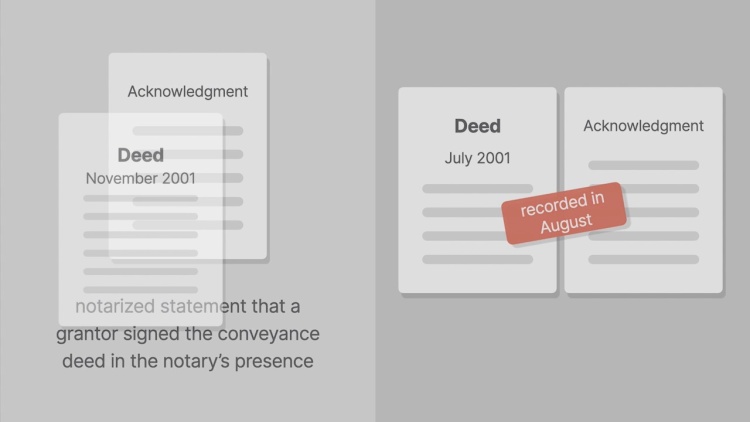Allen v. Allen
Massachusetts Appeals Court
16 N.E.3d 1078 (2014)
- Written by Haley Gintis, JD
Facts
In July 2001, Ethel Allen executed a deed conveying her house to herself and her son, Harold Allen (defendant), as joint tenants with a right of survivorship. A attorney who was a notary public signed a certificate of acknowledgment stating Ethel had signed the deed in his presence. In November 2001, Ethel executed a deed conveying her house to her daughter, Deborah Allen (plaintiff), with instructions to sell the house and divide the proceeds. The deed was recorded in February 2002. Upon Ethel’s death in December 2009, Harold sought ownership of the home by revealing the July deed. In response, Deborah filed an action in Massachusetts state court, claiming she was the rightful owner of the home pursuant to the November deed. Deborah presented evidence that the certificate of acknowledgment was not properly executed because Ethel had not signed the deed in the attorney’s presence. The trial court found that the evidence supported the view that Ethel had signed the July deed but not in the attorney’s presence. The judge then concluded that the deed was not properly recorded because of the deficiency and that it did not give Deborah constructive notice of the conveyance. Thus, the July deed was not enforceable against Deborah, and Deborah was the rightful owner of the property. Harold appealed on multiple grounds, including that the trial court improperly considered the authenticity of the acknowledgment and that the finding was erroneous. Harold also argued that a defect in the acknowledgment did not affect his ownership of the property because Deborah had actual notice of the July deed and, alternatively, that notice was not required because Deborah became Ethel’s heir and devisee upon Ethel’s death. Harold failed to introduce any evidence to support his actual-notice argument. The court of appeals considered the case.
Rule of Law
Issue
Holding and Reasoning (Katzmann, J.)
What to do next…
Here's why 907,000 law students have relied on our case briefs:
- Written by law professors and practitioners, not other law students. 47,100 briefs, keyed to 996 casebooks. Top-notch customer support.
- The right amount of information, includes the facts, issues, rule of law, holding and reasoning, and any concurrences and dissents.
- Access in your classes, works on your mobile and tablet. Massive library of related video lessons and high quality multiple-choice questions.
- Easy to use, uniform format for every case brief. Written in plain English, not in legalese. Our briefs summarize and simplify; they don’t just repeat the court’s language.





